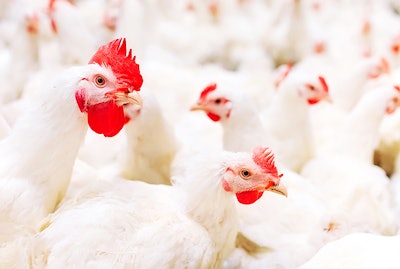
Researchers at the Roslin Institute at The University of Edinburgh recently hypothesized gut microbe transplantation could make chickens less susceptible to Campylobacter, a bacterium that causes food poisoning.
The gut microbiome is a collection of microorganisms present in the gastrointestinal tract. In recent years, the microbiome has captured the attention of researchers, who have linked the microbial makeup of the gut to a variety of health conditions in humans and animals.
“Given the results of previous studies in mice, we thought that inherited differences in resistance to gut pathogens might be transferable by transplanting gut microbiota from chickens that are resistant to chickens that are susceptible,” explained Dr. Cosmin Chintoan-Uta, study co-lead, the Roslin Institute.
Campylobacter is the cause of one of the leading foodborne illnesses worldwide. More than 48 million Americans get sick from a foodborne illness each year and 3,000 people die as a result, the Center for Disease Control and Prevention (CDC) estimates.
The bacteria can be difficult to treat, and many strains have become multi-drug resistant, concluded a recent report. Approximately four out of every five instances of Campylobacter in people results from handling and eating contaminated chicken meat.
The study
The scientists first investigated the composition of the microbiome of two chicken lines that had been shown to differ in resistance to Campylobacter. They then transplanted the gut bacteria of the line of chickens that are resistant to the bacteria into birds that were genetically at a higher risk of being infected.
Surprisingly, the transplanted microbes only survived in the new hosts for a short time and even made the birds more susceptible to Campylobacter.
“We were surprised to find that while heritable differences in resistance of chickens to Campylobacter exist, these are not explained by significant variation in the gut microbiota,” Trong Wisedchanwet, study co-lead, the Roslin Instute, said
The study was published in the journal Applied and Environmental Microbiology.
Like what you just read? Sign up now for free to receive the Poultry Future Newsletter.
















